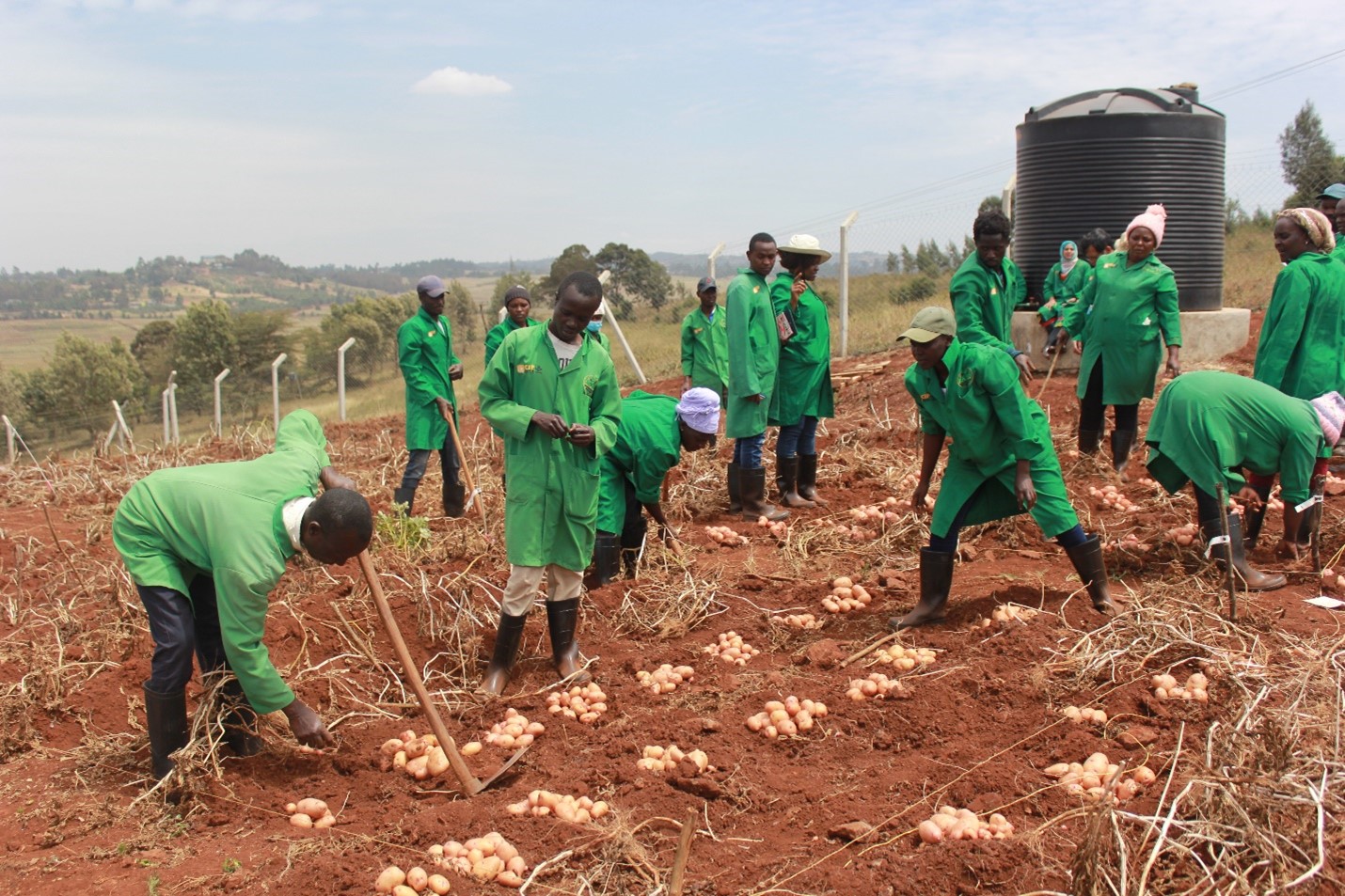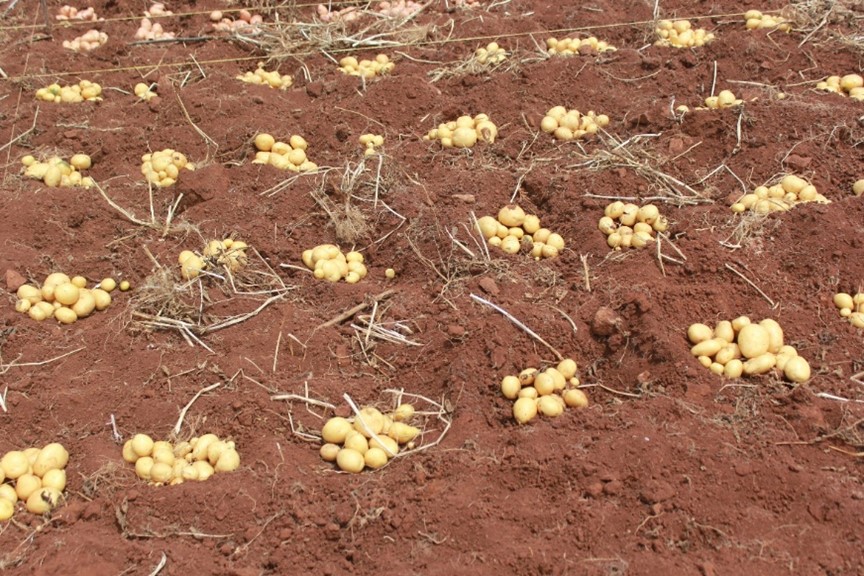
[Nairobi, Kenya; August 2023] A group of international and national researchers working on a biotech potato project are upbeat in developing and delivering potato varieties that are free from the destructive late blight disease in Kenya.
The researchers are currently evaluating the prospects of four genetically modified biotech potato varieties through Confined Field Trials (CFTs) in three potato growing regions including Muguga, Njabini and Molo in Kenya.
According to Dr. Catherine Taracha, KALRO’s Principal Investigator (PI) to the project, data collected from the CFTs will be evaluated to guide on the best varieties to proceed to National Performance Trials (NPTs).
Speaking during the harvesting of the crop at the Muguga CFT, Dr. Taracha noted that the potato sector is plagued by many problems, among them being potato late blight whose management still poses a great challenge, particularly among smallholder farmers in the potato growing areas in Kenya. To obtain a good harvest, these farmers must spray up to 20 times of chemicals to control late blight.
“Potato is a key food as well as cash crop in the highlands of Kenya and is extensively produced by smallholder farmers. It is the second most significant food crop in Kenya after maize employing over 2.5 million persons. It plays a key role in Kenyan food security and contributes to alleviation of poverty,” said Dr. Taracha.
She added that about 30 to 60 percent of the potato crop is lost to the late blight yearly in Kenya. “The inability of resource-strained farmers to control late blight, the optimum management of the disease in Kenya is likely to be achieved through development of biotech varieties and this is currently being conducted in the country in a project termed the Global Biotech Potato Partnership,” she pointed out.
Mr. Erick Korir, principal biosafety officer at the National Biosafety Authority (NBA) noted that the agency approved the CFTs for the biotech potato for KALRO and other project partners to carry out trials on the late blight disease for three seasons to allow collection of enough data to inform the next phase of the project under multi-location CFTs (ML-CFTs) in the country.
Mr. Korir expressed his satisfaction with the biosafety protocols at the CFT site, noting that since biotech crops contain foreign genes, their field-testing is carried out under regulated conditions, hence the tested biotech varieties must remain within the CFT trial site until they have been approved for environmental release by NBA.

There is hope in sustaining potato farming in Kenya if the biotech varieties are eventually released to farmers through the research project led by Kenya Agricultural and Livestock Research Organization (KALRO) in Kenya under the Feed the Future Global Biotech Potato Partnership project that seeks to resolve the lingering challenge of late blight disease, by developing and releasing potato varieties that are resistant to the disease.
The harvest from the second round of ML-CFTs shows that the biotech potatoes have a yield advantage and do not require a single chemical spray, when compared to the conventional varieties which have severely suffered from late blight.
Dr. Taracha said the project hopes to release late blight resistant potato varieties to farmers within two years, adding that they would expedite the release of the new varieties to boost harvests and income for farmers from sale of surplus produce.
The Feed the Future Global Biotech Potato Partnership project is implemented in four countries including Kenya, Nigeria, Bangladesh, and Indonesia. It is led by Michigan State University, and involves various partners including KALRO, AATF, and International Potato Center (CIP) in Africa.
Dr. Eric Magembe, the project lead in Kenya and from CIP, observed that as a biotechnologist, he knows firsthand the losses that farmers are going through. He noted that data from the ongoing ML-CFTs will lead to the selection of the best varieties to be released to farmers and will eventually increase potato production for food and nutritional security as well as incomes. These biotech potatoes will also see less use of chemicals to control the disease, and this will have a positive impact on the overall health of farmers and the environment.
########
About the Feed the Future Global Biotech Potato Partnership (https://www.canr.msu.edu/biotechpp/About/)
The Feed the Future Global Biotech Potato Partnership is a five-year project managed by Michigan State University that focuses on the commercialization of late blight disease resistant potatoes in farmer-preferred varieties in Bangladesh, Indonesia, Kenya, and Nigeria. The project is a collaboration between MSU, the International Potato Center (CIP), the University of Minnesota, the University of Idaho, African Agricultural Technology Foundation (AATF), and partner country National Agricultural Research Systems; Bangladesh Agricultural Research Institute (BARI), Indonesia’s National Research and Innovation Agency (BRIN), Kenya Agriculture and Livestock Research Organization (KALRO), and Nigeria’s National Root Crops Research Institute (NRCRI). Building the capacity of the National Agriculture Research Systems, or NARS, to conduct this research in the four countries is also a primary goal of the project. The project also works with local partner country organizations such as Farming Future Bangladesh. The project is funded through Feed the Future, the U.S. Government’s global hunger and food security initiative led by the United States Agency for International Development (USAID).
About AATF (www.aatf-africa.org)
Founded in 2003 to address Africa’s food security prospects through agricultural technology, AATF believes that the agricultural sector is a key foundational pillar as Africa consolidates its economic growth and carves out its new position as a major global economic powerhouse and the next growth market in the world. It was formed in response to the need for an effective mechanism that would facilitate and support negotiation for technology access and delivery and formation of appropriate partnerships to manage the development & deployment of innovative technologies for use by smallholder farmers in SSA.
For further information, please contact:
Mr. George Achia, Communications Officer, East and Southern Africa, AATF; G.achia@aatf-africa.org ; +254785334163







































































